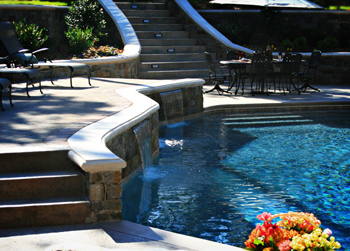 On the matter of Tulsa pool design, there is an increasing debate between chlorine versus salt water pools. There are advantages and disadvantages to each type of swimming pool. In the end, it really depends on which type is better for your lifestyle, family, and overall needs. Although there are many points to consider, it is nice that there are more choices in pool design today. Below are a few of points to consider.
On the matter of Tulsa pool design, there is an increasing debate between chlorine versus salt water pools. There are advantages and disadvantages to each type of swimming pool. In the end, it really depends on which type is better for your lifestyle, family, and overall needs. Although there are many points to consider, it is nice that there are more choices in pool design today. Below are a few of points to consider.Salt water pools are literally easier on the eyes. Although they do still have some chlorine in them, salt water pools do not create all the harsh effects that chlorinated pool systems do. They are less likely to cause dry skin and red eyes than chlorinated pools. And they won’t leave that tough chlorine odor on your skin for hours after you swim. These pools can be safer for your pets and family.
Salt is corrosive. Because salt by nature is very corrosive, it can be harder on surrounding materials causing them to wear out faster. Experts have reported that nearby ladders, decking, concrete and furniture has been damaged by salt water systems. Thus, when building a salt water pool, it’s important to pick materials that can endure the effects of salt.
Salt water pools may require less regular maintenance. To keep a chlorine pool clean and safe, it’s important to have a constant routine of testing the pH levels of the water and then adding chlorine depending on those levels. Continually adding more chlorine to balance out the water may cost more in maintenance.
Ehow.com noted that extra chlorine may be needed to remove chloramines that are formed from free chlorine mixing with organic substances. While chlorine kills contaminants, the website quoted the Chicago Tribune as saying, chloramines remain, and more chlorine is needed to eliminate the chloramines that are irritating to the eyes and skin. Having an inadequate chlorine balance can also cause a build-up of algae. The website also noted that chlorine pools should be shocked every three to four weeks to eradicate excess bacteria.
 Salt water pools use a generator unit to separate dissolved salt into the water. This generator creates its own chlorine from the salt and sends a regular stream of this chlorine into the water. This will keep the chlorine levels in the water more consistent, thus causing less harm to your skin and eyes. However, this generator unit does mean extra up-front costs in building the salt water pool versus a chlorine pool. A good salt-to-water ratio and good pH levels must still be maintained, Wright’s Pool Service, Inc. of Indiana noted, but you just have to add more salt to maintain the levels. This may be easier and more cost-effective than constantly adding chlorine manually, so maintenance may be less time-consuming with a salt water system.
Salt water pools use a generator unit to separate dissolved salt into the water. This generator creates its own chlorine from the salt and sends a regular stream of this chlorine into the water. This will keep the chlorine levels in the water more consistent, thus causing less harm to your skin and eyes. However, this generator unit does mean extra up-front costs in building the salt water pool versus a chlorine pool. A good salt-to-water ratio and good pH levels must still be maintained, Wright’s Pool Service, Inc. of Indiana noted, but you just have to add more salt to maintain the levels. This may be easier and more cost-effective than constantly adding chlorine manually, so maintenance may be less time-consuming with a salt water system.Professionals also say that the salt water pool generator may need to be cleaned a number of times during the year to remove build-up and may eventually need to be replaced.
So what type of pool is better? Well, it may be contingent on what the pool owner wants to care for and what he or she likes best overall. Salt water and chlorine pools may have a similar number of pros and cons in the end. As a Tulsa homeowners, it may come down to preference, but there are viable options in the world of Tulsa pool design.

No comments:
Post a Comment